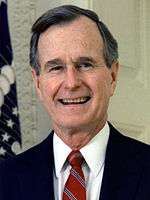United States presidential election in Iowa, 1992
| | |||||||||||||||||||||||||||||||||||||||
| |||||||||||||||||||||||||||||||||||||||
| |||||||||||||||||||||||||||||||||||||||
|
| |||||||||||||||||||||||||||||||||||||||
| County Results
Clinton—50-60%
Clinton—40-50%
Clinton—<40%
Bush—<40%
Bush—40-50%
Bush—50-60%
Bush—70-80% | |||||||||||||||||||||||||||||||||||||||
| |||||||||||||||||||||||||||||||||||||||
| Elections in Iowa |
|---|
 |
|
|
The 1992 United States presidential election in Iowa took place on November 3, 1992, as part of the 1992 United States presidential election. Voters chose seven representatives, or electors to the Electoral College, who voted for President and Vice President.
Iowa was won by Democratic Governor Bill Clinton of Arkansas with 43.29% of the popular vote over incumbent Republican President George H.W. Bush's 37.27%, a victory margin of 6.01%. Independent businessman Ross Perot finished in third with 18.71% of the popular vote.[1] Clinton ultimately won the national vote, defeating incumbent President Bush and Perot.[2]
Results
| United States presidential election in Iowa, 1992[1] | |||||
|---|---|---|---|---|---|
| Party | Candidate | Votes | Percentage | Electoral votes | |
| Democratic | Bill Clinton | 586,353 | 43.29% | 7 | |
| Republican | George H.W. Bush | 504,891 | 37.27% | 0 | |
| Independent | Ross Perot | 253,468 | 18.71% | 0 | |
| Natural Law | Dr. John Hagelin | 3,079 | 0.23% | 0 | |
| Write-ins | 2,102 | 0.13% | 0 | ||
| America First | James "Bo" Gritz | 1,177 | 0.09% | 0 | |
| Libertarian | Andre Marrou | 1,076 | 0.08% | 0 | |
| Grassroots | Jack Herer | 669 | 0.05% | 0 | |
| Independent | John Yiamouyiannis | 604 | 0.04% | 0 | |
| Taxpayers’ | Howard Phillips | 480 | 0.04% | 0 | |
| Socialist Workers Party | James Warren | 273 | 0.02% | 0 | |
| Democrats for Economic Recovery | Lyndon LaRouche | 238 | 0.02% | 0 | |
| New Alliance Party | Lenora Fulani | 197 | 0.01% | 0 | |
| Totals | 1,354,607 | 100.0% | 7 | ||
| Voter Turnout (Voting age/Registered) | 65%/80% | ||||
Democratic caucuses
In the 1992 Iowa Democratic caucuses, most candidates for the Democratic nomination did not campaign in Iowa because of the presence of Tom Harkin, a longtime Senator representing Iowa.[3]
Harkin was running for President in 1992 as a populist with labor union support who criticized George H.W. Bush for being out of touch with working class Americans.[4] Harkin was an early favorite in a small field of five candidates. Harkin easily won the caucus with 76% of the vote, uncommited got second place with 11%, Senator Paul Tsongas came in third with 4%, and Governor Bill Clinton finished fourth with 2%.
Because the race was not contested, these results had little effect on the remaining primaries, and the New Hampshire primary took on added importance.[3]
| Iowa Democratic Presidential Caucus Results – 1992 [5] | ||||||
|---|---|---|---|---|---|---|
| Party | Candidate | Votes | Percentage | Delegates | ||
| Democratic | Tom Harkin | 2,314 | 77.24% | 26 | ||
| Democratic | Uncommitted | 355 | 11.85% | 15 | ||
| Democratic | Paul Tsongas | 128 | 4.27% | 0 | ||
| Democratic | Bill Clinton | 76 | 2.54% | 7 | ||
| Democratic | Robert Kerrey | 72 | 2.40% | 0 | ||
| Democratic | Jerry Brown | 51 | 1.70% | 1 | ||
Tom Harkin won every county by large margins. The delegate totals reflect their final distribution, not their projected allocation immediately following the caucus.
By congressional district
| District | Bush | Clinton | Representative |
|---|---|---|---|
| 1st | 34% | 46% | Jim Leach |
| 2nd | 35% | 44% | Jim Nussle |
| 3rd | 36% | 45% | Jim Ross Lightfoot |
| 4th | 39% | 43% | Neal Smith |
| 5th | 42% | 38% | Fred Grandy |
References
- 1 2 "1992 Presidential General Election Results - Iowa". U.S. Election Atlas. Retrieved 8 June 2012.
- ↑ "1992 Presidential General Election Results". U.S. Election Atlas. Retrieved 8 June 2012.
- 1 2 http://www.boston.com/bostonglobe/editorial_opinion/oped/articles/2007/12/16/the_comeback_kid/
- ↑ Miller, Judith: "Tom Harkin's Old-Time Religion" , New York Times Magazine, February 9, 1992
- ↑ Dave Leip's US Election Atlas




